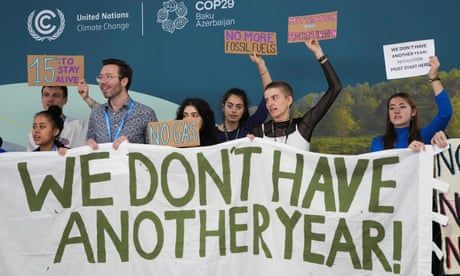
G20 communique in Rio contains key lines on climate confirming world set to transition away from fossil fuels
Good news for progress at Cop29 came not from Baku but from Rio de Janeiro early on the morning of day eight of the log jammed talks, writes Fiona Harvey, Guardian environment editor.
The G20 communique contained key lines on the climate that confirmed the world would transition away from fossil fuels.
We welcome and fully subscribe to the ambitious and balanced outcome of the UN Climate Change Conference in Dubai (COP28), in particular the UAE Consensus and its first Global Stocktake of the Paris Agreement (GST-1).
We will respond positively to the GST-1 encouragement for Parties to the Paris Agreement to come forward in their next nationally determined contributions with ambitious, economy-wide emission reduction targets, covering all greenhouse gases, sectors and categories and aligned with limiting global warming to 1.5 C, as informed by the latest science, in the light of different national circumstances.
This is a positive signal from the G20, that despite their differences, they’ve reaffirmed their support for an agreement to be reached at Cop29 on the new climate finance goal. This momentum must now be translated into concrete outcomes in Baku. Amid slow Cop29 progress, the world must find ways to keep bridging divisions because the escalating climate impacts will not spare any country and jointly taking action is in all our best interests.
The finance goal to be agreed at Cop29 needs to significantly scale up public finance and it’s time for the polluting fossil fuel industry to pay up as a critical source of financing. We hope the G20 declaration will propel talks in Baku to the positive outcome the world desperately needs.
In their communiqué it was encouraging to see the G20 countries recognising that climate finance needs to be in trillions, not billions. That is the scale of the need in developing countries facing the climate crisis and is what the outcome at Cop29 needs to address. Public finance is essential to deliver the climate finance goal.
For a long time vulnerable nations and civil society have been pushing governments to adopt innovative taxation to raise the needed finance for climate change. So it’s good to see the communiqué talk about the role of taxation on the ultra-rich individuals who are often some of the biggest polluters. Making polluters pay and addressing tax dodging are additional elements that should be considered.
Continue reading...